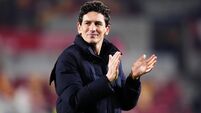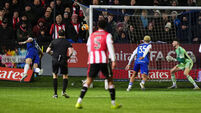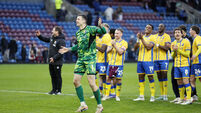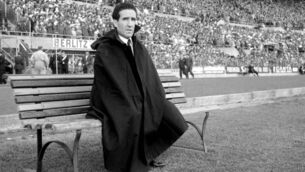Putting the Pep in the step of Barcelona
Many of his best friends, however, are novelists. He is bookish. This leaves him open to lampooning in the laddish world of football.
There is a satirical show on Catalan TV called Crackòvia. In it, he is often depicted wandering into Barcelona’s team dressing room immersed in a book of poetry, the sight of which sends his players scampering for cover.
“Everything is for doing and everything is possible,” he says sanctimoniously, reciting the words of a famous Catalan poem.
The traces of Guardiola’s personality that seep out occasionally suggest he is not completely dry. When a Madrid newspaper dispatched a journalist to ask him if he pissed perfume, he thought for a second and then replied deadpan: “Maybe they are right; maybe I do piss perfume.”
Like many of the players schooled at La Masia, Barcelona’s famous soccer academy, Guardiola tries to be humble. When Gerard Piqué and Víctor Valdés rose their hands to fans with fingers outstretched — one for every goal scored — after last season’s 5-0 filleting of Real Madrid, they were quickly censured by Carles Puyol. Their team captain gestured frantically with his eyes towards the stand. Guardiola had sent out a message — he didn’t want any gloating.
How much has changed in a year. 12 months later, almost to the day, Real Madrid briefly pulled six points ahead of Barcelona in La Liga (since reduced to three points with a game in hand). Until a couple of weeks ago, two points was the most Guardiola trailed Real Madrid since becoming Barça manager three and a half seasons ago.
The teams play each other tonight at the Bernabéu. José Mourinho’s team is in imperious form. Barcelona are playing well, too. Their record at home reads 39-0.
Yet the Catalan press are anxious. Barça lost points on the road — 11 after 15 games. Last season, they only dropped 18 in total, four of which were squandered after they secured the title.
In a two-horse league, a kind of “Scotland in the sun”, they can ill afford to drop many more points. A loss in the Clásico could put the kibosh on their season. It represents Guardiola’s sternest test since taking charge.
Part of the problem is that he has set the bar so high. In his first season in charge, he won six trophies, including the Champions League, which made him the tournament’s youngest winning manager. Last May, of course, in obliterating Manchester United 3-1 at Wembley, he added a second title.
Commentators have breathlessly installed Guardiola’s Barcelona team on the same hall of fame as football’s great sides, alongside Di Stéfano’s Real Madrid, Cruyff’s Ajax and the Milan of Van Basten. Their pinball, possession brand of football is a marvel to watch.
He drives himself relentlessly. His assistants complain he doesn’t eat enough. When asked by a journalist last season if he wouldn’t enjoy the greater control that managers have in club football in Britain, he blurted: “But I don’t want more responsibility! I’ve already lost my hair and got a bad back.”
He is a strict disciplinarian. He once fined Leo Messi for being a minute late for training, and, of course, he had the cojones to remove troublesome characters from Barcelona’s ranks, including Ronaldinho, Deco, Samuel Eto’o and, most notably, Zlatan Ibrahimovic, who, according to the Swede’s autobiography, once threatened to beat up the Catalan chief in public.
Xavi, his midfield general, reckons he’s an obsessive. “He keeps going until he gets it right, no matter what he’s doing” he said recently.
“If Pep Guardiola decided to be a musician, he would be a good musician. If he wanted to be a psychologist, he would be a good psychologist.”
For Guardiola, the perfectionist, little things haven’t been perfect this season. The squad has been wracked by injury, 17 in total in less than four months, which could be down to the inexorable aggrandisement of FC Barcelona. Before the first team used to do pre-season training, he has complained; now they just do pre-season tours.
He is missing Pedro’s fast, unpredictable darts from the wing in particular. His captain and force of nature, Puyol, has started only a third of the team’s league games this season. Last weekend, he withdrew after 35 minutes. It will be a bad omen, if nothing else, if he doesn’t feature against Real; remarkably, he has missed every one of Barcelona’s last seven losses.
The endless tinkering Guardiola is prone to, including a three-man defence, hasn’t always worked. The team is over-reliant on Messi. The Argentinian has popped 17 league goals already this season, but significantly he hasn’t scored away, and it is on the road where Guardiola’s men have been frail.
Guardiola works on rolling one-year contracts. He has constantly stressed how stressful it is manning the tiller at Barcelona. He says that it’s important to know when to go, that players get tired of hearing the same patter from a coach, and that the coach, too, tires of players.
This season may well be his last at Barcelona. He has left the club before — as a player, who won six La Liga titles and a European Cup, he walked away in 2001, still in his prime. He speaks good English. He is coveted in Italy, above all leagues, where he played for a few years at the end of his career. How great a manager is Guardiola? He is working with a prodigious collection of players in his own backyard. How would he fare elsewhere? “I’d like to see him try,” scoffs Mourinho.













